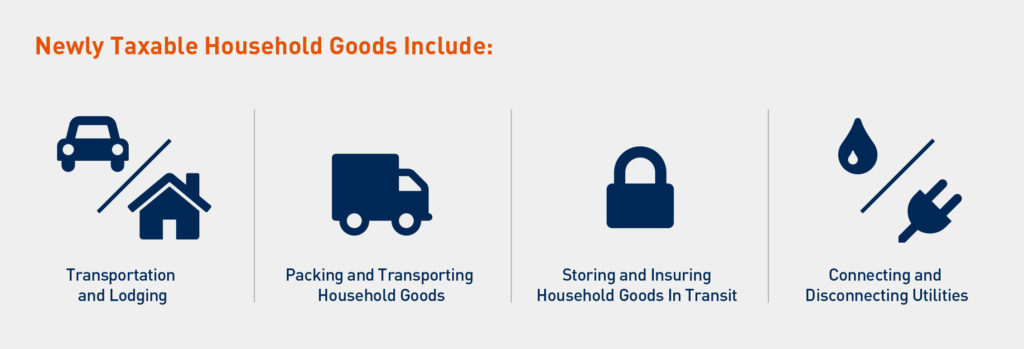A Taxing Holiday: Fortune 100 Reaps Savings at the 11th Hour

Managing New Tax Codes — At Whose Expense?
Mobility professionals work with employees every day to ease transitions. So what happens when they’re the ones dealing with sudden change?
On December 22, 2017, the Tax Cuts and Jobs Act (TCJA) was signed into law, effective January 1, 2018. As a result, household goods expenses incurred during employee relocations were no longer deductible.
Graebel’s client, a global insurance company, usually processed expense reports for relocations in November and December the following year. Now, only days away from the new tax code policies going into effect — and in the middle of the holiday season when resources were already scarce — its Global Mobility team had to act quickly or miss out on a significant amount of deductions.
The team needed to collect itemized deductions from recent assignees for all costs associated with packing, shipping, storing and delivering household goods, automobiles and even pets, then reclassify and process the tax filings — all within nine days. It required a total team effort, including help from Graebel, their new relocation management services partner.
Challenges:
- Household goods and moving expenses become taxable with 2017 U.S. tax code
- Only days to address looming tax code changes
- Recoding required dedicated resources
Recode To Recover Household Goods Expenses
Uncertainty over the most significant tax code overhaul in decades dogged Mobility professionals throughout 2017. Would the bill pass? When? What items would be impacted? As an industry leader in workforce mobility, Graebel had been tracking this legislation and how it might impact client costs.
As soon as the new tax code was signed into law, Michael Nero, Director of Account Management at Graebel, met with key decision-makers, including executives and managers in Mobility and Payroll, to prepare them for the impending onslaught of new tax filings. Nero and his team recommended that they recode and reclassify all November and December relocation expenses before the end of the year, so they could be processed under 2017 tax guidelines.
Each report had to be painstakingly processed and recoded for 2017. Knowing that the client lacked the necessary resources to handle such a heavy workload while facing a tight deadline during the holidays, the Graebel team stepped in to manage the administrative burden. The process involved scouring expense reports for household goods deductions line-by-line. With each passing moment against the looming deadline, a substantial list of deductible household expenses piled up.
“We didn’t want poor timing to be the reason our client missed out on saving a significant amount of money. So we dug in, got to work and processed the tax filings for them. It paid off for the client, as well as for its employees who were able to enjoy their holidays at home instead of in the office.” – Michael Nero, Director of Account Management, Graebel
Solutions:
- Met with key company stakeholders immediately to discuss options
- Examined all relevant expense reports looking for tax-exempt items
- Reclassified and recoded household goods expenses
Realizing Immediate Cost Savings
Graebel identified 145 household goods line items — totaling more than $510,000 USD — that were recoded and reclassified for 2017. As a result, the insurance company saved about $275,000 USD in deductions, which proved significant in helping the Mobility program meet its yearly budget thanks to the last-minute tax code overhaul. Plus, because Graebel handled most of the recoding, the client’s internal team was spared from working extra hours during the holiday season.
The new partnership between Graebel and the global insurance company continues to grow. Prior to the project, the client relied on Graebel primarily for day-to-day transactional tasks. Now, the partnership includes more strategy-driven meetings and initiatives in hopes that the team can improve the global mobility program, whether it’s capturing important information to simplify decision-making, uncovering cost savings or identifying
new opportunities.
“We were impressed with Graebel’s speed and flexibility on this project. All told, by working together, we completed the project in less than two weeks. And now we have the confidence to rely on Graebel more than ever.”– Global Mobility Supervisor, Fortune 100 Insurance Company
Results:
- Saved client approximately $275,000 USD
- Convinced client that there are other tax-related cost-saving opportunities
- Client’s Mobility team didn’t have to work extra hours during holidays
Ensuring Successful Relocations Worldwide
As a large insurance provider for tens of thousands of individuals, families and businesses, our client relocates about 1,500 employees domestically and internationally every year. Its 10-person Global Mobility team manages a wide range of everyday relocation transactions, challenges and strategies — working closely with Human Resources, Talent Management, Payroll and other internal teams.
In 2017, our client partnered with Graebel to help devise and implement new Global Mobility strategies, expedite and simplify everyday relocation tasks, offer guidance and more.
